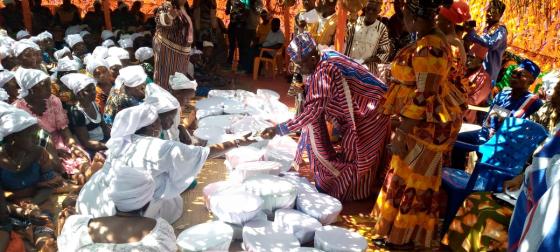Liberia: Female Genital Mutilation Ban Extends to Nimba County

Chief Karwar performing some traditional rituals doing the turnover of FGM tools
Traditional leaders in Liberia have announced the "total ban" on all practices of female genital mutilation (FGM) in Nimba County.
The decision, made by the National Council of Chiefs and Elders of Liberia, follows a similar move in Bong County, where FGM is deeply entrenched, just like in Nimba County.
This latest ban is part of the Council's partnership with the Ministry of Gender, Children & Social Protection and the Ministry of Internal Affairs. Their goal is to encourage their members to abandon the centuries-old traditional practice, which the World Health Organization has identified as a risk to women's health. Instead, they are promoting alternative livelihood skills to reduce economic dependency on FGM.
"The culture business is good, but the culture has evolved over time. We have decided to brave this change while we continue our work," said Chief Zanzan Karwor, the Chairperson of the Council, at a ceremony in Gbanquoi, Nimba County, to end the practice of FGM in the county.
"You must let go of the harmful aspects of our culture, specifically genital mutilation, and focus on what is more suitable for our present times," Karwor added as he watched the ritual that marked the end of the practice being performed.
This ritual involves surrendering the tools used for FGM. Nimba County has been recognized as one of the places where FGM has been prevalent, sometimes leading to the forced conscription of girls.
The government of Liberia has been making concerted efforts to eradicate the practice of FGM for decades, as it has deep-rooted cultural and social significance. However, these efforts failed until recently, when UN Women and other international partners decided to provide economic skills to members of the traditional council as an incentive to end the practice.
The approach, piloted in Montserrado, Grand Cape Mount, Lofa, and Nimba, has led to the establishment of vocational and heritage centers to reduce the dependence on FGM for economic livelihood.
Despite the ongoing ban, Liberia remains one of the three West African countries that do not have a law criminalizing FGM, even though it has signed and ratified regional and international human rights instruments condemning the practice as a human rights violation, including the Maputo Protocol.
Only a few cases have gone through the justice system, covered under Section 242 of the Penal Code, which addresses malicious and unlawful injuries towards another person by cutting off or otherwise depriving them of any body part. This is punishable by up to five years in prison. In July 2011, members of the politically influential Sande secret society who had kidnapped and forcibly subjected someone to FGM were sentenced to three years' imprisonment. However, they appealed the judgment and were released on bail. The appeal has been pending at the Supreme Court with no hearing date set, and the perpetrators remain free.
According to the U.N. Children's agency (UNICEF), half of Liberian women have been subjected to FGM, while four in 10 Liberians support the practice in communities where it is carried out.
"If we say we are marginalized and want violence against women to stop, then we cannot be the same group to carry on violence against children," noted Liberia's Cultural Ambassador, Juli Endee, who urged traditional female leaders to desist from harmful traditional practices related to FGM.
Endee made these remarks during the inauguration of a women's culture center built by UN Women with funding from the Swedish Government. She noted that the center will also provide training in sewing, hairdressing, and other skills to empower women.
"We cannot sacrifice our children's future for the small gains we obtain from such practices. Let's focus on the future of our children and abandon something that is not internationally acceptable," she said.
Comfort Lamptey, the Country Representative of UN Women, expressed her happiness that the practice of FGM was being banned in Nimba and other places across Liberia. She noted that true leaders embrace change for the greater good of their people.
"Thank you for embracing change to ensure that this generation and the future generation of women and girls can go through all the cultural rights of passage as part of being Liberian women, but without the harmful aspect, which is FGM," Lamptey said.
